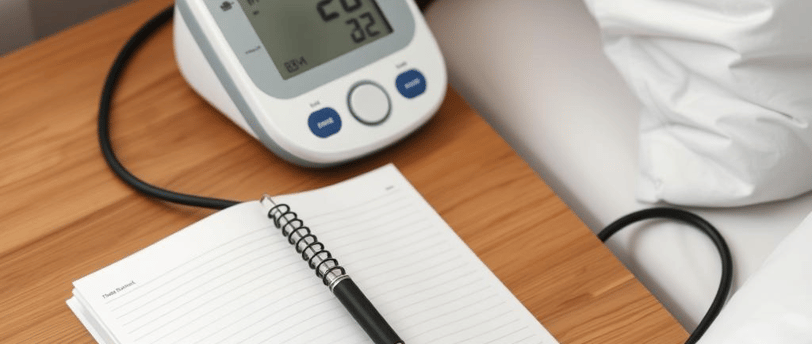Monitor Your Blood Pressure Regularly: Prevention is Key to Long-Term Heart Health
🧘WELLNESS TIPSHEART HEALTH & CIRCULATION❤️


It’s easy to overlook our health amidst work commitments, family responsibilities, and daily stressors. One of the most critical aspects of maintaining good health is keeping an eye on your blood pressure. The heart is the engine of our body, and its health is paramount to our overall well-being. In this article, we will explore the significance of regular blood pressure monitoring, the scientific evidence supporting its importance, and actionable steps you can take to maintain optimal heart health.
Understanding Blood Pressure
Before diving into the importance of monitoring blood pressure, it is essential to understand what it is. Blood pressure measures the force of blood against the walls of your arteries. It is recorded with two numbers: systolic pressure (the first number) measures the pressure when the heart beats, while diastolic pressure (the second number) measures the pressure when the heart rests between beats. Normal blood pressure is typically considered to be around 120/80 mmHg. However, various factors can influence these numbers, including diet, stress levels, physical activity, and genetics.
Why Blood Pressure Matters
High blood pressure, or hypertension, is often termed the "silent killer" because it can cause significant damage to the heart and blood vessels without any noticeable symptoms. According to the American Heart Association (AHA), nearly half of all adults in the United States have high blood pressure, yet many are unaware of their condition. This statistic is alarming because uncontrolled hypertension can lead to severe health complications, including heart disease, stroke, kidney failure, and even death.
The Role of Scientific Evidence
Scientific evidence underlines the necessity of monitoring blood pressure regularly. Numerous studies have demonstrated the direct correlation between high blood pressure and cardiovascular diseases. The Framingham Heart Study, one of the longest-running cardiovascular studies, found that even slightly elevated blood pressure levels can significantly increase the risk of heart disease over time. Research published in the Journal of the American College of Cardiology suggests that individuals with hypertension are 3 to 4 times more likely to experience heart failure compared to those with normal blood pressure.
In addition to these long-term risks, regular monitoring can help identify potential problems early on. For instance, a study conducted by the British Medical Journal showed that patients who monitored their blood pressure at home had a higher likelihood of achieving and maintaining target blood pressure levels compared to those who did not. This evidence supports the idea that self-monitoring can lead to better outcomes in heart health.
Preventive Measures and the Importance of Regular Monitoring
Regularly monitoring your blood pressure is not just a tool for those diagnosed with hypertension; it is a proactive measure everyone should embrace. By keeping track of your blood pressure, you can better understand how your lifestyle choices impact your heart health. Here are some preventive measures you can implement alongside regular monitoring:
1. Healthy Diet
A balanced diet plays a crucial role in managing blood pressure. The DASH (Dietary Approaches to Stop Hypertension) diet, which emphasizes fruits, vegetables, whole grains, lean proteins, and low-fat dairy, has been scientifically proven to lower blood pressure. Reducing sodium intake is also vital, as high sodium levels can lead to water retention and increased blood pressure.
2. Regular Physical Activity
Engaging in regular physical activity can help lower blood pressure and improve overall heart health. According to a study published in the American Journal of Hypertension, just 30 minutes of moderate exercise most days can significantly impact blood pressure levels. Activities like walking, jogging, cycling, and swimming are excellent options to consider.
3. Stress Management
Chronic stress can contribute to high blood pressure. Techniques such as mindfulness, yoga, deep breathing exercises, and meditation can help manage stress levels. A study published in the journal Hypertension indicated that individuals who practiced mindfulness had lower blood pressure levels compared to those who did not.
4. Avoiding Tobacco and Excessive Alcohol
Tobacco use and excessive alcohol consumption are significant contributors to hypertension. Quitting smoking and limiting alcohol intake can dramatically improve heart health. The Centers for Disease Control and Prevention (CDC) indicates that reducing alcohol consumption can help lower blood pressure levels.
5. Regular Health Check-ups
In addition to monitoring your blood pressure at home, regular check-ups with your healthcare provider are essential. These visits can help identify any emerging issues and allow for timely interventions. Blood pressure should be measured at least once a year, but those with risk factors or existing hypertension may require more frequent assessments.
How to Monitor Your Blood Pressure
Monitoring your blood pressure at home is easier than you might think. Here are some steps to ensure you do it effectively:
Choose the Right Device: Invest in an automatic, cuff-style blood pressure monitor for accuracy. Ensure it is validated and fits properly.
Follow the Instructions: Read and follow the manufacturer's instructions to get an accurate reading. Position yourself comfortably with your arm
